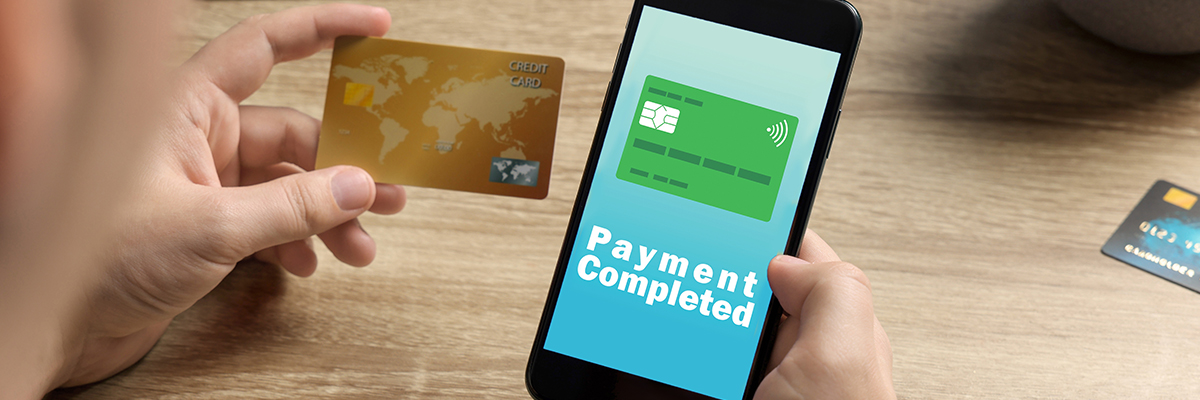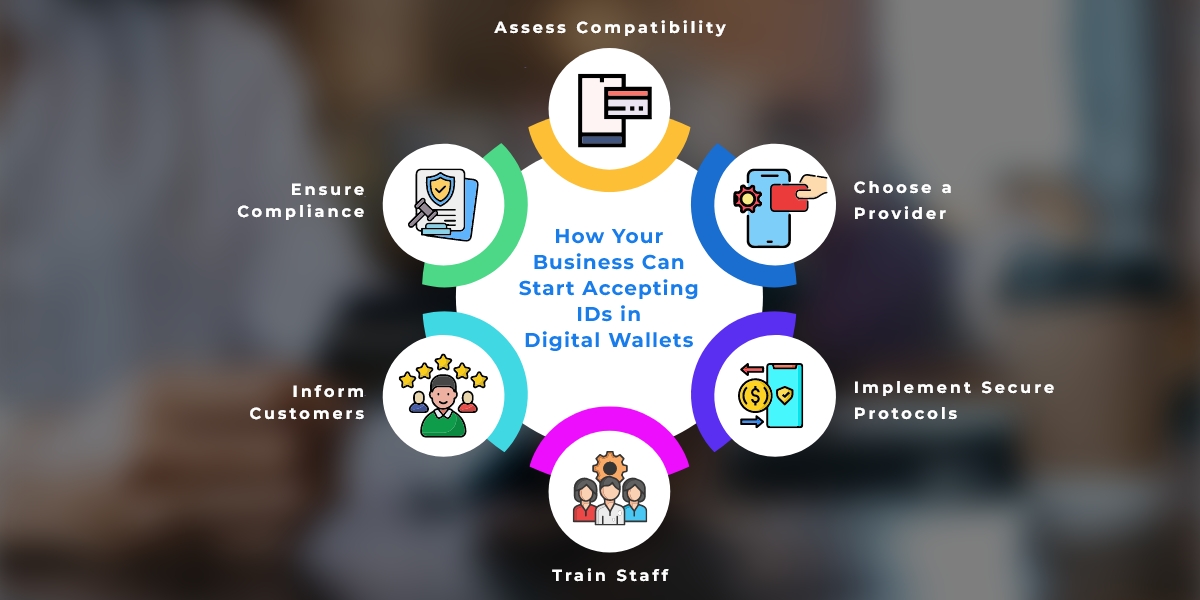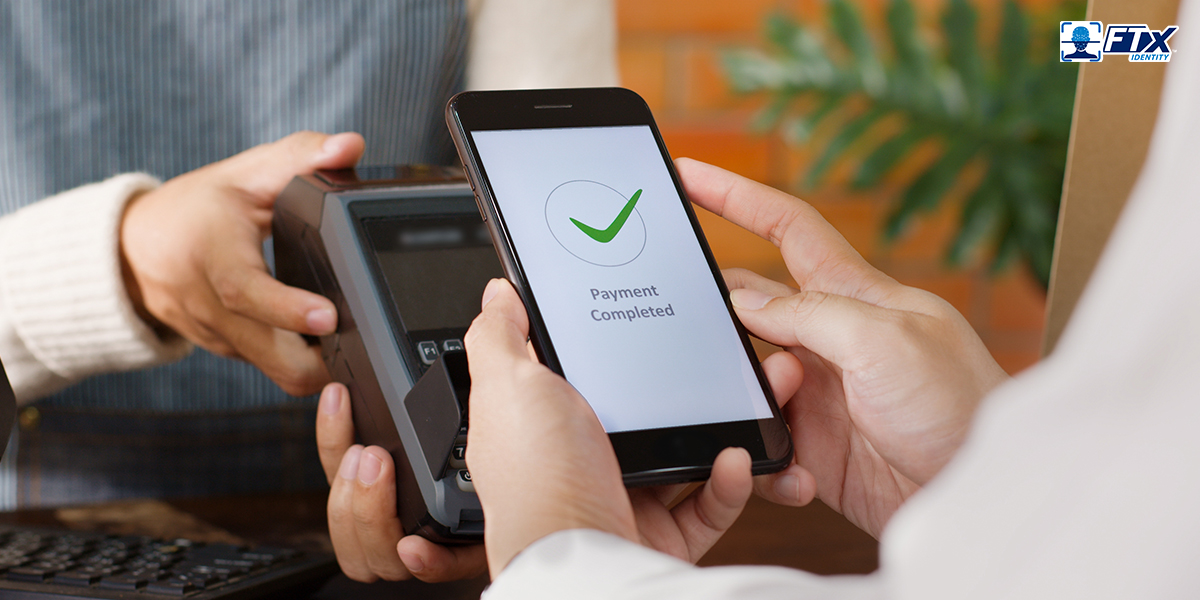Digital wallets are more popular than ever. In fact, 53% of Americans use them.
While using a digital wallet, foodies, travelers, and shoppers can experience the ultimate convenience at the touch of a button. Whether it’s splitting a sushi dinner with a friend visiting from out of town or clicking on your driver’s license to pick up an order, it’s all within easy reach.
In the age of seamless convenience, businesses can’t afford to miss out on the digital wallet revolution! Let’s face it, no one wants to sift through a deck of cards to find the right one!
But how exactly does a digital wallet work? How can your businesses start accepting IDs in digital wallets? How safe are they? We have the answers for you!

What Is a Digital Wallet?
Let’s cut to the chase: what exactly is a digital wallet?
A digital wallet is an application that enables users to conduct secure money transactions across any linked device. It safely stores passwords, ID cards and credit card information on the cloud.
In essence, it empowers customers to make payments or verify their identity without the burden of physical cards. By simply inputting and storing credit cards, debit cards, driver’s licenses, or bank account details, they can seamlessly utilize their digital wallet on their device for purchases or identification verification.
A digital wallet isn’t limited to storing the previously mentioned items; it can also manage a range of items including gift cards, concert tickets, plane tickets, hotel reservations, and much more.
We’ve sure come a long way from when in Coca-Cola first introduced those two vending machines in Helsinki, Finland back in 1997. You could buy a soda just by shooting a text—that was the early spark that ignited today’s digital payment and e-wallet revolution!
How Does a Digital Wallet Work?
Digital wallets securely transmit payment data from a user’s device to a point of sale by utilizing their device’s wireless capabilities, such as Bluetooth, WiFi, and magnetic signals, establishing a connection to read the data. To initiate a transmission, users need to unlock their device, select their payment option, and hold their device close to the card reader.
The technologies employed by digital wallets and mobile devices include:
QR Codes
Mobile device cameras can scan Quick Response (QR) codes, which are matrix barcodes, to initiate data transmission. These QR codes are utilized for making payments through digital wallets.
When the customer transmits their payment information from their digital wallet using the methods mentioned, the POS terminal or card reader forwards the transaction details to the customer’s payment processor. Subsequently, the payment processor contacts the issuing and acquiring banks to finalize the purchase.
Magnetic Secure Transmission (MST)
Smartphones equipped with Magnetic Secure Transmission (MST) technology emit an encrypted signal resembling credit and debit card magnetic strips. When a digital wallet featuring MST is tapped or held nearby, the encrypted payment data is transmitted to the card reader.
Near-Field Communication (NFC)
Contactless payments primarily utilize Near-Field Communication (NFC) technology. NFC enables secure communication of payment information between devices, such as smartphones, smartwatches, and certain credit cards, with card readers and payment terminals, all without the need for physical contact.

Are Digital Wallets Safe?
To put it simply, yes.
Digital wallets incorporate a security feature called tokenization, a process that replaces sensitive encrypted data with non-sensitive digital equivalents, or tokens.
Whenever a user initiates a payment, the digital wallet generates a unique, one-time token comprising random numbers. Only the merchant’s payment gateway can match this token to process the payment.
The combined use of encryption and tokenization renders information useless and indecipherable to fraudsters. Even in the event of a retailer being hacked, a customer’s payment details remain safeguarded due to the multiple layers of protection.
Compared to using a physical card’s chip or magnetic stripe, digital payments are generally considered more secure, not only because of tokenization but also due to the added requirement for authentication. If a physical card is stolen, it’s relatively easier for unauthorized use.
However, digital wallets typically offer additional layers of security, such as fingerprint scans, facial recognition, or password protection, further fortifying the safety of transactions.
Benefits of Embracing Digital Wallets for Businesses
While the terms “easy” and “quick” are often associated with digital wallets, it’s important to highlight the distinct advantages they bring to businesses.
- Enhanced Customer Experience: Digital wallets provide a user-friendly and convenient payment method. Customers appreciate the ease of use and the ability to manage their payments digitally. This convenience often leads to higher satisfaction and increased loyalty.
- Faster Transactions: Digital wallets expedite transactions. With just a few taps on a smartphone or a click of a button, payments can be made swiftly, reducing checkout times significantly. This efficiency is beneficial for both customers and businesses, especially during peak shopping periods.
- Increased Security: Digital wallets employ robust security measures, such as encryption, tokenization, and biometric authentication, making it difficult for unauthorized individuals to access sensitive payment information. This advanced security reduces the risk of fraud, ensuring a safer transaction environment for both businesses and customers.
- Higher Conversion Rates: Due to the streamlined and user-friendly nature of digital wallets, businesses often experience higher conversion rates. When the payment process is quick and hassle-free, customers are more likely to complete purchases, translating into increased sales for businesses.
- Reduced Operational Costs: Digital wallets can potentially reduce operational costs for businesses. Handling physical cash or maintaining traditional payment systems often incurs additional expenses. With digital wallets, the need for such resources diminishes, leading to potential cost savings.
- Improved Customer Loyalty: The positive experience of using digital wallets contributes to enhanced customer loyalty. Businesses that offer convenient payment methods tend to retain customers who appreciate the efficiency and ease of using these platforms.
- Global Accessibility: Digital wallets are not limited by geographical boundaries. They offer businesses the opportunity to cater to a broader audience, including international customers. This accessibility allows for more extensive market reach without the limitations of location-specific payment methods or physical currency.

How Your Business Can Start Accepting IDs in Digital Wallets
- Assess Compatibility: Begin by examining your existing systems and infrastructure. Ensure they are capable of integrating with digital wallet features for storing and verifying IDs. This evaluation will help determine whether your technology can support these functionalities or if any upgrades or adjustments are necessary.
- Choose a Provider: Research and select a digital wallet service or platform that supports the storage and validation of IDs. Evaluate different providers based on compatibility with your systems, security measures, ease of integration, and other relevant features that align with your business requirements.
- Implement Secure Protocols: When integrating digital wallet ID functionality, prioritize security. Incorporate robust encryption, tokenization, and other secure protocols within your systems to ensure the safe storage and verification of digital IDs. This is crucial for safeguarding sensitive customer information.
- Train Staff: Educate your employees on the process of accepting and verifying digital IDs through the chosen digital wallet service. Ensure they are well-versed in using the features and can assist customers with the ID verification process. Proper training minimizes errors and ensures a smooth transition for both employees and customers.
- Inform Customers: Communicate the introduction of ID acceptance through digital wallets to your customer base. Emphasize the convenience, security, and ease of the new method through various marketing channels, such as emails, website announcements, or in-store signage. Clarify the steps customers need to take and reassure them about the security measures in place.
- Ensure Compliance: Understand and adhere to the legal and regulatory requirements associated with accepting digital IDs. Ensure that your business complies with relevant laws concerning the handling and protection of customer information, safeguarding their privacy and ensuring legal integrity.
Conclusion
Digital wallets, a staple for 53% of Americans, offer unmatched convenience in various spheres. From seamless transactions to ID acceptance, their safety and versatility redefine modern payment systems. For businesses, embracing these wallets means enhanced customer experience, security, and expanded market access—essential in today’s evolving financial landscape.
Ready to explore FTx Identity for yourself? Be sure to get in touch with us today to schedule a consultation and experience a demo!
